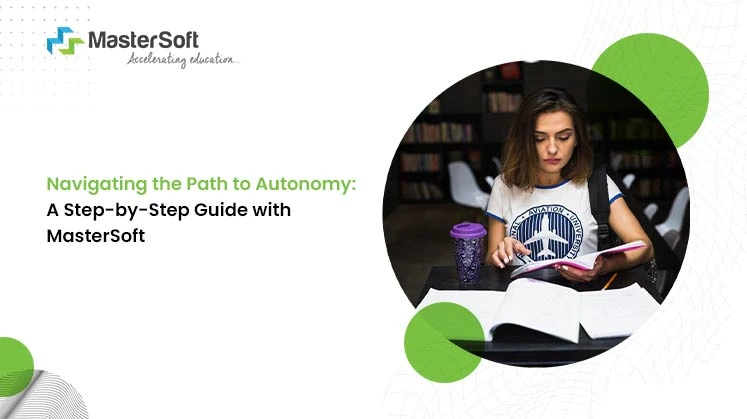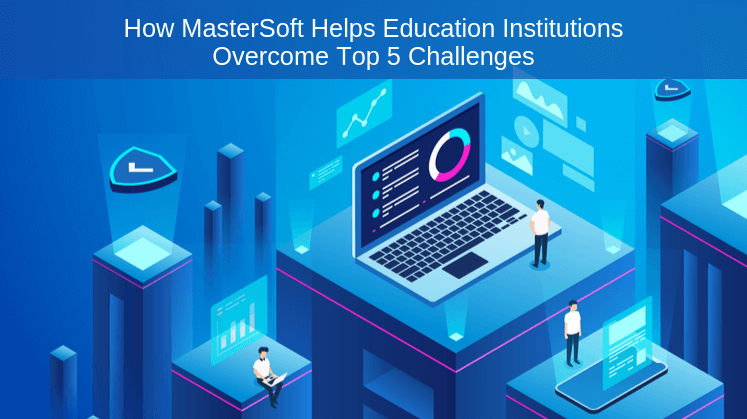06, Nov 2023
Education is a cornerstone of human development and progress, and the transformation of educational institutes has been an ongoing endeavour to ensure that students receive the best possible learning experience. One crucial aspect of this transformation is autonomy. Educational institutes are increasingly seeking autonomy in their operations and decision-making processes to foster innovation, adaptability, and efficiency.
Technology has played a significant role in facilitating this autonomy transformation. Let’s understand how technology has been driving this change in autonomous institutions.
Navigating The Path To Autonomy: A Step-By-Step Guide With MasterSoft
Autonomy in Educational Institutes
Autonomy in educational institutes refers to the degree of independence and self-governance that these institutions have in making decisions regarding their operations, curriculum, and policies. Traditionally, many educational institutions have been subject to rigid regulations and guidelines set by government authorities.
However, as society evolves and as the demands and expectations of students and employers change, there is a growing need for greater autonomy in educational settings.
Autonomous institutions have the freedom to design their curriculum framework, set their admission criteria, manage their budgets, and make decisions about faculty and staff. They can adapt more readily to the specific needs of their students and can respond to market demands and technological advancements with agility.
In short, autonomous institutions foster innovation and can lead to better learning outcomes.
Technology as a Catalyst for Autonomy
Technology, especially in the form of ERP systems, has been a driving force for autonomy in educational institutes in several significant ways, which includes:
Administrative Efficiency:
Technology has streamlined administrative tasks, allowing educational institutes to manage their operations more efficiently. Digital record-keeping, student information systems, and cloud-based solutions for financial management have made it easier for institutions to handle day-to-day administrative tasks.
This increased efficiency allows them to focus on strategic decision-making rather than getting bogged down in paperwork.
Personalised Learning:
The use of ERP systems in education has enabled personalised learning experiences. Adaptive learning platforms, educational apps, and online courses provide students with the opportunity to learn at their own pace, catering to their individual needs and preferences.
This personalisation can extend to curriculum design, allowing autonomous institutions to tailor their offerings to meet the specific needs of their students.
Data-Driven Decision-Making:
Technology allows educational institutes to collect and analyse data on student performance and engagement. With this data, institutions can make informed decisions about curriculum adjustments, faculty evaluations, and other strategic choices.
Data-driven decision-making empowers autonomous institutions to respond more effectively to the evolving needs of their students and the job market.
Collaboration and Communication:
ERP system technology facilitates communication and collaboration both within and beyond autonomous institutions. Faculty, staff, and students can easily share information and resources using digital platforms.
Additionally, technology allows for partnerships and collaborations with other educational institutions, industry, and research organisations, fostering innovation and knowledge exchange.
Online Learning:
The rise of online learning platforms has provided educational institutes with the flexibility to expand their reach and offer courses to a global audience. This not only increases their autonomy by reducing their reliance on local enrollments but also generates additional revenue streams.
Let's explore how various ERP systems, including Learning Management Systems (LMS), Student Information Systems (SIS), and HR Management Systems (HRMS), are playing a pivotal role in this transformative journey.
Customising Your Education Management System For Specific Needs
Learning Management Systems (LMS):
Learning Management Systems (LMS) have emerged as a driving force in promoting autonomy within educational institutions.
- LMS empowers autonomous institutions to offer personalised learning experiences, where students can create individualised learning journeys.
- Educators can customise course content, assignments, and assessments, granting students the autonomy to progress at their own pace and based on their unique interests.
- LMS software provides institutions with the autonomy to diversify course delivery methods.
- This flexibility aligns with the evolving preferences of students, enabling institutions to offer a wide range of learning modalities, including online, hybrid, and traditional classroom-based courses.
- LMS ERP systems gather valuable data on student performance and engagement.
- This data empowers autonomous institutions to make data-driven decisions regarding curriculum adjustments, ensuring alignment with specific educational objectives and student needs.
Student Information Systems (SIS):
Student Information Systems are fundamental for managing student data and administrative operations, significantly contributing to autonomy within educational institutes:
- SIS systems grant institutions the autonomy to define their admission criteria and design their registration process according to their unique mission and objectives.
- This autonomy allows institutions to tailor their admissions processes to meet specific goals.
- SIS ERP systems streamline student records management, ensuring data accuracy and security.
- This autonomy in records management allows institutions to maintain control over their data and ensures that it is easily accessible when needed.
- SIS systems offer comprehensive reporting and analytics capabilities, providing insights into enrollment trends, demographics, and academic performance.
- These insights enable institutions to make data-driven decisions, promoting autonomy in enrollment and strategic planning.
National Education Policy 2020: All You Need To Know About NEP 2020 For Schools
HR Management Systems (HRMS):
HR Management Systems are instrumental in managing faculty, staff, and other human resources, enhancing autonomy within educational institutions:
- HRMS ERP systems empower institutions to autonomously manage their workforce, including recruitment, performance evaluations, and payroll administration.
- This autonomy allows institutions to operate in a manner that aligns with their specific goals and vision.
- With HRMS, institutions can autonomously design and implement faculty and staff development programs that align with their unique needs and goals. This autonomy extends to the creation of training initiatives tailored to their mission.
- HRMS gathers data related to faculty and staff performance, allowing institutions to make informed decisions about promotions, tenure, and professional development based on specific criteria.
- This data-driven approach promotes autonomy in HR management, ensuring that decisions are aligned with the institution's objectives.
- The transformation of educational institutes towards greater autonomy is an ongoing and crucial process that aligns with the evolving needs of students and the job market.
- Technology has been a driving force in this transformation, enabling institutions to streamline their operations, personalise learning experiences, make data-driven decisions, and collaborate effectively.
Wrapping It Up,
The transformation of educational institutes towards greater autonomy is an ongoing and crucial process that aligns with the evolving needs of students and the job market. Technology has been a driving force in this transformation, enabling institutions to streamline their operations, personalise learning experiences, make data-driven decisions, and collaborate effectively.
As educational institutions continue to evolve in response to the changing needs of students and the demands of the modern world, ERP systems will remain a cornerstone of their autonomy transformation efforts.
Streamline Teaching-Learning Process with MasterSoft’s Edication Management System
Mobile: 08448010216
Email: janki.somani@iitms.co.in














